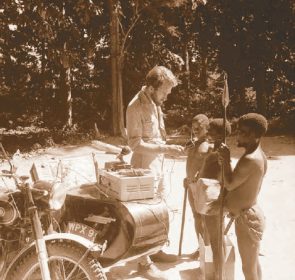Colin M. Turnbull was born in Harrow, England and educated at Magdalen College, Oxford. After serving in World War II in the British Royal Navy, he returned to Oxford and finished his education. Turnbull ultimately received his Ph.D. from Oxford in 1964. He also studied in India under Sri Anandamayl Ma and Sri Aurobindo (1949 and 1951), and then went to Africa where he was introduced to the Mbuti Pygmies.
The Mbuti Pygmies became a lifelong passion for Turnbull. As the African Ethnology curator for the American Museum of Natural History, he was in a unique position to return to the Ituri Forest in Africa to live with and research the region and its people. From his years of studying the Mbuti Pygmies, Turnbull produced his seminal book, The Forest People (1961). This very personal analysis of the Mbuti Pygmies and their culture was a unique view of a very rich and complex society that was often looked down upon by other peoples in the area and the world. Turnbull brought to the world stage all that was good and positive about the Pygmy culture and society. Through their songs and rituals, theses pygmies showed a deep love for life in the African forest. Turnbull also collected the songs of the Mbuti Pygmies and presented them in collections for the American Museum of Natural History. The love and esteem that he felt for the Mbuti Pygmies was immense, and he would see their life as a metaphor for his own life. Throughout his career, Turnbull wrote many other books about the Mbuti Pygmies of the Ituri Forrest and the conditions of the African people.
 In 1965, Turnbull returned to Africa to study its peoples, but this time he did not go to study the Mbuti Pygmies. Instead, he studied the Ik of Uganda. This was a people displaced by the civil strife between Uganda and Kenya, as well as the development of a national wildlife reserve on their traditional hunting ground. Unlike the Mbuti Pygmies, the Ik were a people that because of these circumstances, had reduced their regard for each other to the point where they were immune to the suffering of their family members and other members of their tribe. Turnbull saw this and wrote that the society was not one of lofty values, but that this specific society and its culture were determined by the conditions that the people lived in at that time. Unlike the rave reviews that The Forest People received, The Mountain People (1973) was severely criticized by many anthropological scholars. Some suggested that it was shoddy scholarship and that the book should be banned. Yet, others appreciated the depth to which Turnbull could understand the life and the conditions of the Ik.
In 1965, Turnbull returned to Africa to study its peoples, but this time he did not go to study the Mbuti Pygmies. Instead, he studied the Ik of Uganda. This was a people displaced by the civil strife between Uganda and Kenya, as well as the development of a national wildlife reserve on their traditional hunting ground. Unlike the Mbuti Pygmies, the Ik were a people that because of these circumstances, had reduced their regard for each other to the point where they were immune to the suffering of their family members and other members of their tribe. Turnbull saw this and wrote that the society was not one of lofty values, but that this specific society and its culture were determined by the conditions that the people lived in at that time. Unlike the rave reviews that The Forest People received, The Mountain People (1973) was severely criticized by many anthropological scholars. Some suggested that it was shoddy scholarship and that the book should be banned. Yet, others appreciated the depth to which Turnbull could understand the life and the conditions of the Ik.
Besides working as a curator at the American Museum of Natural History, Turnbull held professorships at a number of universities, including Virginia Commonwealth University and George Washington University. In 1982, he turned down tenure at George Washington University in order to devote his time to caring for his long-time partner Joe Towles.
Turnbull traveled extensively and studied various religions and cultures. He studied Hindu religions in India, the African culture, Samoan culture, and ultimately was ordained as a Tibetan Buddhist monk by the Dalai Lama. He became know as Lobsong Rigdol. In 1994, Colin M. Turnbull died in Lancaster County, Virginia.
References:
- Grinker, R. R. (2000). In the arms of Africa: The life of Colin M. Turnbull. New York: St. Martin’s Press.
- Turnbull, C. M. (1962). The lonely African. New York: Simon & Schuster.
- Turnbull, C. M. (1983). Mbuti pigmies: Change and adaptation. New York: Harcourt Brace.

